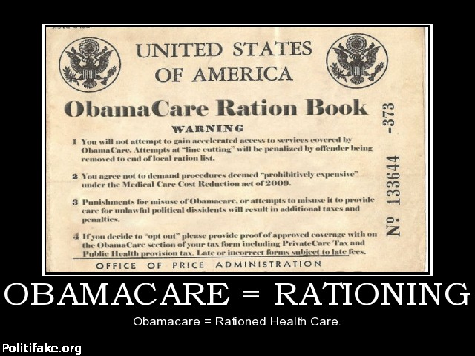
We may not know it until we need it. Some of the medical care we assumed we would get automatically will soon be harder to obtain. A few more obstacles, a few more restrictions, before we can receive the specialized medical treatment or surgery that we need, that we took for granted we could get immediately in a country like America.
As our colleague William Bigelow reported earlier this week, the onset of ObamaCare is causing states to try to save money through rationing, i.e., limiting the number of prescription drugs Medicaid patients may obtain.
Now, according to the Wall St. Journal, in an effort to gain control of costs, some of the nation’s largest health insurers are rather quietly building in more obstacles to medical care as we know it. These insurers are responding to pressure from employers to keep costs down and quality at a similar level across plans. For their part, many employers are banking on the notion that employees will accept trade-offs in order to prevent huge jumps in premiums.
Eric Grossman, a senior partner at Mercer, said employers will be interested in “rigorous, aggressive medical management,” that will include prior authorization and limited networks of health care providers.
It’s important to keep in mind that employers get tax credits for doing “our job” for us, i.e., the job of designing health insurance plans for us. Personally, I would like to decide the kind of health insurance plan my family needs, but for the reasons cited here, many of our citizens and congressional representatives have grown accustomed to the idea that our employers and bosses know the kind of health care plans our families want and/or need.
Drawing on the “managed care” design common during the 1990’s, health insurers are going back to many of the cost-cutting techniques that were the cause of misery for both doctors and patients during that decade. Preparing themselves for 2014, when ObamaCare is in full operation, health insurers are gradually revealing the fact that President Obama’s promise to us, that we could keep our own doctors, was a politically expedient lie.
President Obama’s lie aside, however, we should remember that big health insurers stand to get federal funds funneled to their doors through ObamaCare, so the relationship between the administration and health insurers is a co-dependent one, at best. Let’s not get distracted from the real issues when Obama and the Democrats start bad-mouthing the “greedy and heartless” health insurance companies for rationing care. They are all in it together.
What are the changes we will begin to notice when we need medical care?
First, insurers will begin to restrict our choices of doctors and hospitals. There may be no changes in some plans just yet, but keep aware since being caught off guard when we suddenly need medical care can be both frightening and frustrating. Doctors and health insurers will likely send out letters informing us of changes.
Second, health insurers will be requiring additional criteria for referrals to specialists prior to authorizing payments to these doctors. In more cases as we go forward, if we do not obtain a referral from our primary care doctor, our health insurer may not authorize payment to a specialist, and we could end up with an unexpected bill. Primary care doctors will be acting more as “gatekeepers” to care once again, making sure patients meet required “criteria” before they are referred to specialists.
Of course, health insurers are not going to come out and say they are rationing care, but we know rationing when we see it. Insurers say that new “technology” will be improving health care while it helps them to rein in costs. Personally, I hope that is true, but I fear it is not.
Examples of the changes some of the major health insurers in the country are currently making are as follows:
United Health Group, Cigna Corp., and some others will increase requirements to obtain authorization for patients to receive some specialized treatments. United Health specifically told employers that, over the next 18 months, coordination of patient care will be replaced by a new “prior authorization” process, and that, for some services and tests, including joint replacements and spine surgeries, “services determined to be not medically necessary” will not be covered.
Cigna also is considering requiring prior authorization for procedures in radiation oncology and cardiology.
WellPoint, Inc. is designing an authorization plan for certain cancer drugs and tests that diagnose sleep-related conditions.
Although ObamaCare (Tax) needs to be repealed, we are wise to remember that simply repealing Obama’s signature law will not bring down health care costs to a manageable level. The United States must move toward a system of personal ownership of health insurance, a return to more direct fee for service payment arrangements with providers, and the election of lawmakers who will get government regulations out of the way so that free market principles will prevail in the health care industry.

COMMENTS
Please let us know if you're having issues with commenting.